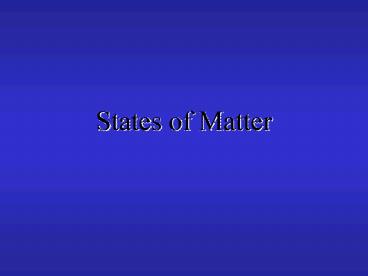States of Matter - PowerPoint PPT Presentation
1 / 6
Title:
States of Matter
Description:
Important notes regarding the states of matter: ... Our in-depth study of the states of matter will begin with the behavior of gases. ... – PowerPoint PPT presentation
Number of Views:40
Avg rating:3.0/5.0
Title: States of Matter
1
States of Matter
2
Traditionally, there are three states of matter
Gas the least organized, most energetic state
Liquid less energetic and somewhat more
organized
Solid highly organized
A fourth state, plasma, consists of ionized gas.
The gas particles are heated to a high
temperature, like that of the sun, at which they
form ions. The presence of charged particles
makes a plasma an electrical conductor. The sun,
stars, and lightening contain plasmas. We will
not study plasmas in this course.
3
Important notes regarding the states of matter
- Most substances can exist in each of the three
states under the right conditions
- State varies with temperature and pressure
- Changing states does not change chemical
properties-they are physical changes.
- There are energy changes that accompany state
changes.
4
Changes of State
- Melting, the change from solid to liquid, is
endothermic (requires the addition of heat),
while freezing, the change from liquid to solid,
is exothermic (requires the release of heat). The
amount of heat lost or gained is identical for a
given substance.
- Vaporization, the change from liquid to gas
(whether it occurs rapidly (boiling) or slowly
(evaporation)), is endothermic, while
condensation, the change from gas to liquid, is
exothermic. Again, the amount of heat lost or
gained is identical for a given substance.
- Sublimation, the change from solid to gas without
entering the liquid state, is endothermic. The
change from gas to solid, like the change from
gas to liquid, is called condensation. As always,
the amount of heat lost or gained is identical
for a given substance.
5
Our in-depth study of the states of matter will
begin with the behavior of gases. This material
correlates with Chapter 5 of your textbook.
6
Repeat This Lesson Go On to the Next
Lesson Return to Gas Lessons Menu Return to
Main Page































